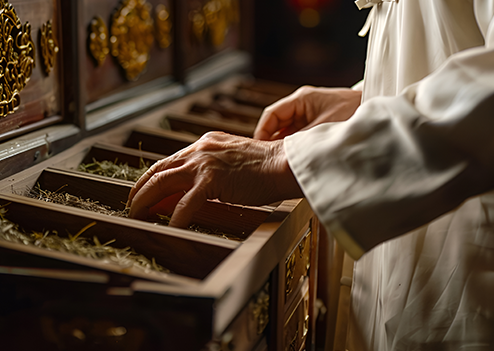Chinese herbal medicine is part of a larger healing system called Traditional Chinese Medicine(TCM).
Herbs are prescribed to restore energy balance to the opposing forces of energy - Yin and Yang - that run through invisible channels in the body.
Herbs can act on the body as powerfully as pharmaceutical drugs and should be treated with the same caution and respect.
The ancient Chinese proposed that every living thing is sustained by a balance of two opposing forces of energy, called Yin and Yang. Together, they make up the life essence, or Qi - a type of energy that flows through the body via invisible channels called meridians. Half of certain organs and meridians are governed by Yin and the other half by Yang. When Yin and Yang are out of balance in the body, this causes a blockage of Qi and a subsequent illness. Yin and Yang imbalances can be caused by stress, pollution, poor diet, emotional upsets or infection. For diagnostic purposes, Yin and Yang are further subdivided into interior and exterior, hot and cold, deficiency and excess.
TCM also includes acupuncture, massage dietary advice and exercise. TCM is a popular method of treatment, with nearly three million Australians visiting TCM practitioners every year.
The underlying principles of TCM are very different from traditional Western notions about health, illness and the workings of the body. Chinese herbs are prescribed to normalise imbalanced energy, or Qi (pronounced ‘chee’), that runs through invisible meridians in the body. Whether or not the philosophy is believed, studies have shown Chinese herbal medicines to be successful in treating a range of disorders, particularly gynaecological and gastrointestinal disorders.
Chinese herbal medicines are mainly plant based, but some preparations include minerals or animal products. They can be packaged as powders, pastes, lotions or tablets, depending on the herb and its intended use. Different herbs have different properties and can balance particular parts of the body. Prescribing a particular herb or concoction of herbs means the practitioner’s diagnosis has to take into account the state of the patient’s Yin and Yang, and the elements that are governing the affected organs.
Herbs can act on the body as powerfully as pharmaceutical drugs and should be treated with the same caution and respect


Online Booking